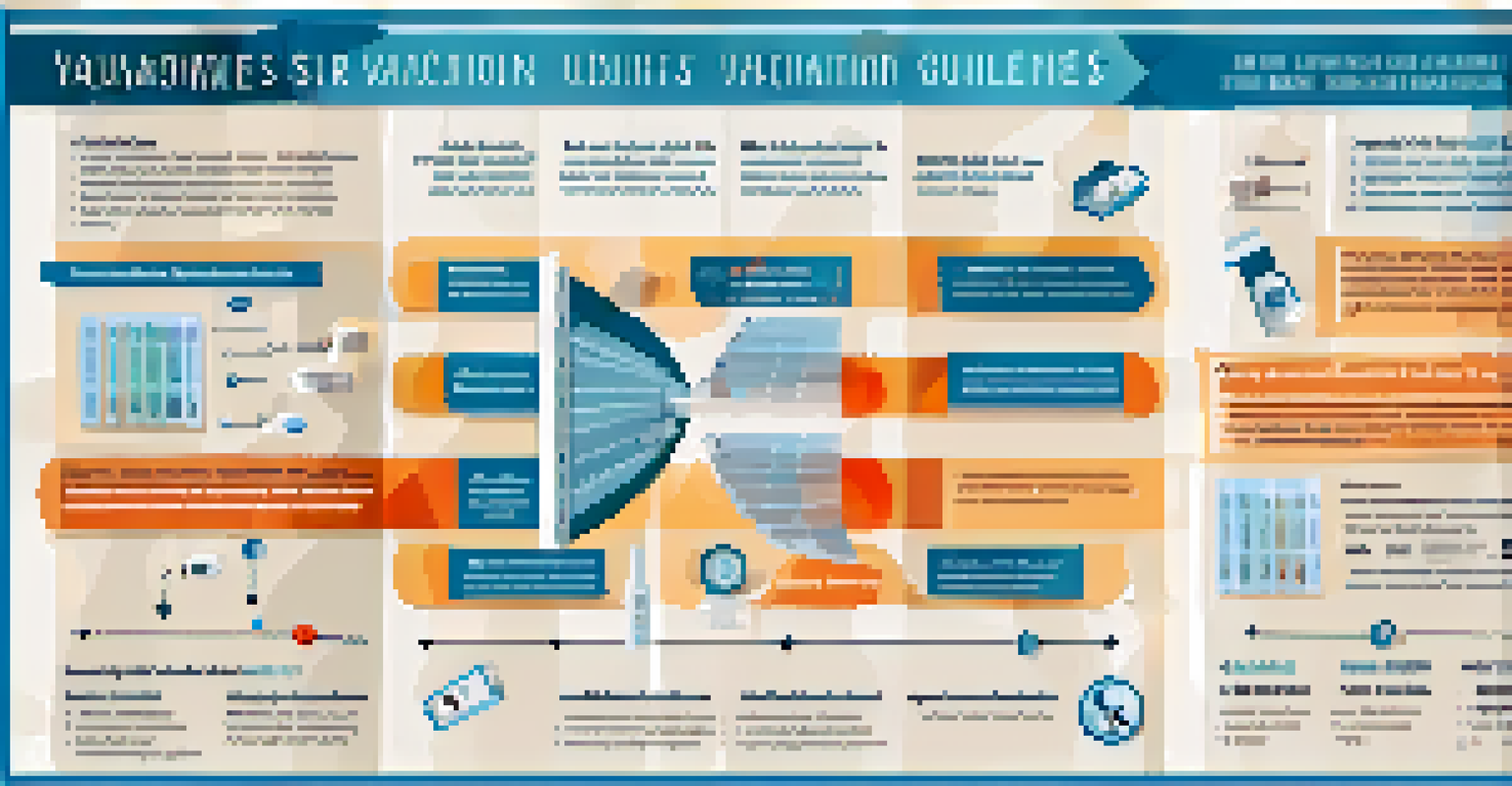Vaccination Schedules: Keeping Up with Recommended Guidelines

Understanding Vaccination Schedules: Why They Matter
Vaccination schedules are essential for ensuring that individuals receive vaccines at the right times. These schedules help protect not only personal health but also public health by preventing the spread of infectious diseases. By following these guidelines, you can minimize the risk of outbreaks and contribute to herd immunity.
Vaccines are the tugboats of preventive health.
The Centers for Disease Control and Prevention (CDC) provides comprehensive vaccination schedules for children and adults. These schedules are based on extensive research and expert recommendations, ensuring that the vaccines given are both safe and effective. Keeping up with these schedules can be overwhelming, but understanding their importance makes it easier.
When you stay informed about vaccination schedules, you can better manage your family's health. Scheduling regular check-ups with your healthcare provider can help you stay on track. Remember, a proactive approach to vaccinations is a vital step in safeguarding your health and that of your community.
Childhood Vaccination Schedule: Key Milestones
The childhood vaccination schedule is designed to protect children during their most vulnerable years. Key milestones include vaccinations at birth, two months, four months, six months, and various ages up to 18 years. By adhering to this schedule, parents can ensure their children are protected from diseases like measles, mumps, and whooping cough.

Many parents may feel overwhelmed by the number of vaccines their children receive, but understanding the schedule can alleviate concerns. Each vaccine is strategically timed to maximize its effectiveness, providing immunity when children are most at risk. Additionally, these vaccines are rigorously tested for safety and efficacy before being approved.
Vaccination Schedules Ensure Safety
Following vaccination schedules is crucial for protecting both individual and public health by preventing the spread of infectious diseases.
Regular visits to the pediatrician can help parents keep track of which vaccines are due. It's also helpful to maintain an up-to-date vaccination record for your child. This not only assists in tracking their health but may also be required for school enrollment or certain activities.
Adult Vaccination Guidelines: Staying Protected
While many people associate vaccinations with childhood, adults also need to stay up to date. Vaccination guidelines for adults include vaccines for influenza, tetanus, and shingles, among others. Keeping these vaccinations current helps protect against preventable diseases that can pose serious health risks.
An ounce of prevention is worth a pound of cure.
One of the most commonly overlooked vaccinations for adults is the flu shot, which is recommended annually. This vaccine can significantly reduce the risk of severe illness, hospitalization, and even death from the flu. Additionally, other vaccines, like the HPV vaccine, can prevent certain types of cancer later in life.
To stay on track with adult vaccinations, it's wise to have an open dialogue with your healthcare provider. They can offer personalized recommendations based on your age, health status, and lifestyle. This proactive approach can help you maintain optimal health as you age.
Vaccination for Special Populations: Tailored Approaches
Some individuals have unique health needs that require tailored vaccination approaches. For example, pregnant women need specific vaccines to protect both themselves and their unborn babies. Vaccines like Tdap and the flu shot are often recommended during pregnancy to ensure maternal and infant health.
Moreover, individuals with chronic health conditions, such as diabetes or heart disease, may require additional vaccinations to prevent complications. Certain vaccines can help reduce the risk of infections that could exacerbate these conditions. Consulting with a healthcare provider is essential for understanding which vaccines are necessary for these populations.
Tailored Vaccinations for Special Needs
Certain populations, like pregnant women and those with chronic conditions, require specific vaccinations to safeguard their health.
Creating awareness about vaccination needs for special populations can lead to better health outcomes. Encouraging friends and family members to discuss their vaccination status with their providers can foster a supportive environment. This collective effort contributes to overall community health.
Navigating Vaccine Hesitancy: Building Trust
Vaccine hesitancy has become a significant barrier to achieving optimal vaccination rates. Many individuals have concerns stemming from misinformation or past negative experiences. It’s crucial to address these hesitations with empathy and provide accurate, evidence-based information.
Building trust is key when discussing vaccinations with hesitant individuals. Sharing personal stories about the positive impact of vaccines can help humanize the discussion. Additionally, encouraging open dialogue can help people feel more comfortable voicing their concerns and asking questions.
Public health campaigns often focus on education and outreach to combat vaccine hesitancy. By creating a supportive environment where individuals feel safe to discuss their fears, communities can work together to improve vaccination rates. Ultimately, the goal is to foster a culture of trust and informed decision-making.
The Role of Technology in Tracking Vaccination Schedules
In today's digital age, technology plays a vital role in managing vaccination schedules. Various apps and online platforms allow individuals to track their vaccination history and receive reminders for upcoming shots. This tech-savvy approach can help ensure that no vaccinations are missed.
Many healthcare providers also use electronic health records (EHRs) to monitor their patients' vaccination statuses. These systems streamline communication between patients and providers, making it easier to stay informed about necessary vaccines. With quick access to vaccination records, patients can feel more empowered in their health decisions.
Technology Enhances Vaccine Tracking
Utilizing apps and electronic health records helps individuals manage their vaccination schedules effectively and stay informed.
Embracing technology can enhance the overall vaccination experience. By leveraging these tools, individuals can take proactive steps to maintain their health and stay up to date with recommended guidelines. This integration of technology ultimately supports healthier communities.
Global Vaccination Efforts: A Collective Responsibility
Vaccination is not just a personal choice; it’s a collective responsibility that impacts global health. Organizations like the World Health Organization (WHO) work tirelessly to promote vaccination efforts worldwide, especially in underserved communities. These initiatives aim to eradicate diseases and prevent outbreaks on a global scale.
When individuals in one part of the world are vaccinated, it contributes to the overall immunity of populations everywhere. Vaccination campaigns can help control diseases that know no borders, emphasizing the importance of global cooperation. By participating in these efforts, individuals can play a role in protecting vulnerable populations.

Supporting global vaccination initiatives can take many forms, from spreading awareness to donating to organizations focused on this cause. Understanding the interconnected nature of health can inspire individuals to take action. Together, we can work towards a healthier world for everyone.